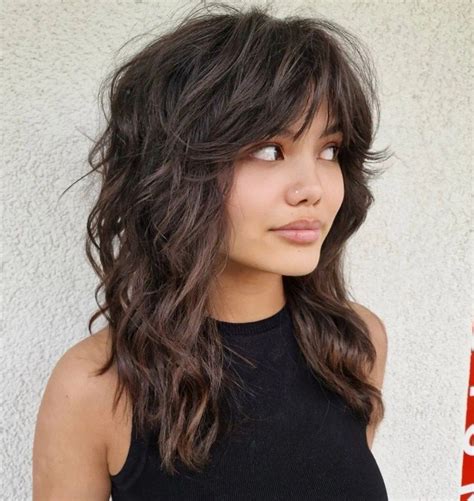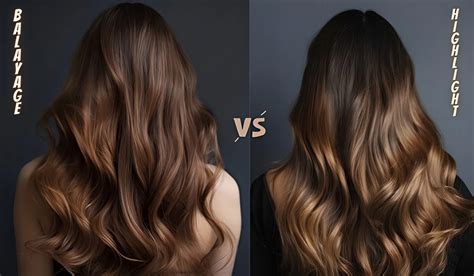What’s the Difference Between Balayage & Highlights?
Balayage and highlights are two popular hair coloring techniques that can transform your appearance. However, there are subtle differences between the two that can affect the overall look and feel of your hair.

1. Application Method
- Balayage: French for “to sweep,” balayage involves hand-painting hair color onto select strands, creating a natural, sun-kissed effect.
- Highlights: Highlights are applied using foils or caps to isolate specific sections of hair for bleaching or color application.
2. Color Placement
- Balayage: Typically applied to the mid-lengths and ends of hair, creating a gradual transition from darker roots to lighter tips.
- Highlights: Can be placed anywhere on the hair, from the roots to the tips, allowing for more precise color placement.
3. Color Intensity
- Balayage: Creates a more subtle, blended look with softer transitions between colors.
- Highlights: Provides more dramatic, distinct color contrasts due to the concentrated application of bleach.
4. Maintenance
- Balayage: Typically requires less frequent touch-ups (every 12-16 weeks) due to the gradual blending of colors.
- Highlights: Need more regular touch-ups (every 8-12 weeks) to maintain the desired contrast and prevent root growth from becoming noticeable.
5. Hair Damage
- Balayage: Less damaging than highlights because bleach is applied only to select strands, avoiding unnecessary chemical processing of the entire head.
- Highlights: Can cause more hair damage due to the use of foils or caps, which trap heat and can lead to breakage.
6. Cost
- Balayage: Typically more expensive than highlights due to the skilled application technique and longer appointment time required.
- Highlights: Generally less expensive, as the application process is less time-consuming.
7. Natural Effect
- Balayage: Creates a more natural, sun-kissed look that mimics the effects of natural sunlight on hair.
- Highlights: Can achieve various looks, from subtle to bold, but may not always appear as natural as balayage.
8. Styling Options
- Balayage: Provides more styling versatility due to the blend of colors, allowing for a range of hairstyles from sleek to tousled.
- Highlights: Can create a bolder, more structured look that may limit styling options.
9. Hair Texture
- Balayage: Suitable for various hair textures, including fine, thick, straight, and curly hair.
- Highlights: May not be suitable for very fine hair, as the bleach can weaken the hair and lead to breakage.
10. Popularity
- Balayage: Has become increasingly popular in recent years due to its natural, low-maintenance appeal.
- Highlights: Remain a classic hair coloring technique, but their popularity may have declined slightly in favor of balayage.
11. Personal Preference
Ultimately, the best choice between balayage and highlights depends on your individual hair needs and preferences. Consider factors such as your desired level of contrast, hair texture, and how much time and effort you want to dedicate to maintenance.
12. Professional Consultation
To make an informed decision, it is recommended to consult with a professional hairstylist who can assess your hair and guide you towards the best coloring technique for your desired look.
Common Mistakes to Avoid
When choosing between balayage and highlights, it’s important to avoid common mistakes that can lead to unsatisfactory results:
- Going Too Light: Avoid choosing a color that is too light for your skin tone, as this can create a harsh or brassy effect.
- Over-Processing: Bleach can damage hair if it is applied excessively. Always follow the recommended application time and avoid over-bleaching.
- Ignoring Hair Health: Prioritize the health of your hair by using color-protecting shampoos, conditioners, and treatments to maintain its strength and shine.
- DIY Disaster: Attempting balayage or highlights at home without proper training can lead to uneven colors, damage, or disappointment.
Why Balayage or Highlights Matter
Choosing the right hair coloring technique can make a significant difference in your overall appearance and confidence:
- Enhance Features: Balayage or highlights can accentuate your facial features, such as highlighting your cheekbones or enhancing the shape of your eyes.
- Boost Confidence: A fresh, new hair color can instantly boost your confidence and make you feel more attractive.
- Stay on Trend: Balayage and highlights remain popular and versatile coloring techniques, keeping you up-to-date with current hair trends.
- Versatile Options: Whether you prefer a natural, sun-kissed look or bold, structured colors, there is a balayage or highlights technique to suit your style.
Benefits of Balayage & Highlights
Both balayage and highlights offer unique benefits that can transform your hair:
Balayage:
- Creates a natural, sun-kissed effect
- Low maintenance with less frequent touch-ups
- Less damaging to hair
Highlights:
- Provides more precise color placement
- Can achieve bolder, more dramatic looks
- Suitable for adding dimension and texture to hair
Table 1: Balayage vs Highlights at a Glance
| Characteristic | Balayage | Highlights |
|---|---|---|
| Application Method | Hand-painted | Foils or caps |
| Color Placement | Mid-lengths and ends | Anywhere on the hair |
| Color Intensity | Subtle, blended | Distinct, contrasting |
| Maintenance | Less frequent touch-ups | More regular touch-ups |
| Hair Damage | Less damaging | More damaging |
| Cost | More expensive | Less expensive |
| Natural Effect | More natural | May be less natural |
| Styling Options | More versatile | May be limited |
Table 2: Balayage vs Highlights for Different Hair Textures
| Hair Texture | Balayage | Highlights |
|---|---|---|
| Fine Hair | Yes | May not be suitable |
| Thick Hair | Yes | Yes |
| Straight Hair | Yes | Yes |
| Curly Hair | Yes | Yes, but may require more precision |
Table 3: Balayage vs Highlights for Different Skin Tones
| Skin Tone | Balayage | Highlights |
|---|---|---|
| Fair Skin | Ashy, blonde tones | Subtle, golden tones |
| Medium Skin | Caramel, honey tones | Copper, brown tones |
| Dark Skin | Chocolate, mahogany tones | Rich, warm tones |
Table 4: Balayage vs Highlights for Different Face Shapes
| Face Shape | Balayage | Highlights |
|---|---|---|
| Oval | Any placement | Any placement |
| Round | Placement near the face to slim | Vertical highlights to elongate |
| Square | Placement away from the face to soften | Diagonal highlights to soften angles |
| Heart | Placement around the hairline to widen | Highlights around the cheeks to balance |
Conclusion
Whether you choose balayage or highlights, selecting the right hair coloring technique is essential for achieving a stunning transformation that complements your individual style. By understanding the key differences between these techniques and considering your specific hair needs, you can make an informed decision that will leave you feeling confident and radiant.
